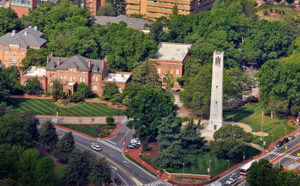by WorldTribune Staff, November 24, 2017
A conservative think tank is touting its role in “advancing needed reforms” on college campuses in North Carolina, including free speech legislation that was passed by the state’s legislature this summer.
The James G. Martin Center for Academic Renewal thanked its supporters “for helping us make great strides this year in advancing needed reforms in North Carolina,” said Jenna Robinson, president of the center.

North Carolina’s legislature passed a campus freedom of expression bill that will prevent college administrators from disinviting speakers some on campus find objectionable and disciplines those who “shut down” the speech of others.
The Restore Campus Free Speech Act passed the NC House 80-31 with 10 Democrats voting in favor and passed the NC Senate 34-11 along strict party lines.
The Martin Center said it also helped shape UNC Board of Governors’ decision to take action on other key issues, according to a report by the Raleigh News & Observer.
“Four problems that we have highlighted in our work have been addressed by North Carolina policymakers in the last six months,” Robinson said.
Robinson cited:
- The UNC board’s action in September to bar the UNC Center for Civil Rights from filing lawsuits.
- The free speech law, which is soon-to-be policy for UNC campuses.
- The UNC board’s consideration of hiring its own staff separate from the office of UNC President Margaret Spellings.
- A study of campus equal opportunity and diversity compliance offices, with an eye toward more consolidation.
UNC board member Marty Kotis said the center was “absolutely instrumental” in the free speech bill and the question of hiring staff for the board.
Kotis said he attended events on the free speech issue hosted by the center, saying “They definitely were one of the primary advocates for that.”
Steve Leonard, a political science professor at UNC-Chapel Hill, acknowledged the Center’s influence, but disagreed on its benefit to the state’s education system.
“While they certainly can argue that they have influenced policymakers and decision makers and lawmakers on these matters, the problem is the arguments they’ve produced,” Leonard said.
He called resulting policy “slipshod and sloppy,” adding the center’s influence suggests the board and legislature “have been not been independent in their assessments and thinking about the issues facing public higher education in this state.”
Lou Bissette, chairman of the UNC board, said of the Martin Center: “I don’t feel like they’re manipulating the board in any way that I can discern.”
The James G. Martin Center for Academic Renewal, established in 2004, began as a project of the John Locke Foundation in Raleigh.
Subscribe to Geostrategy-Direct __________ Support Free Press Foundation
